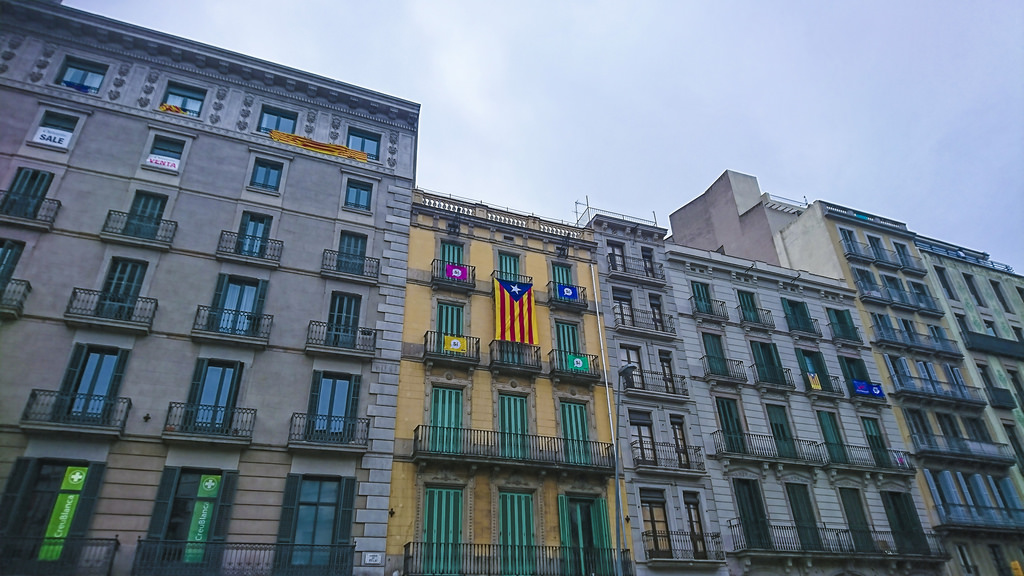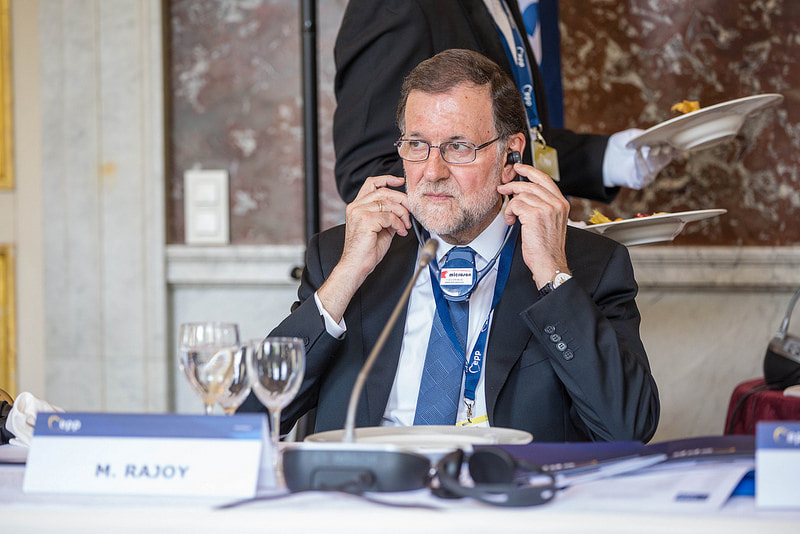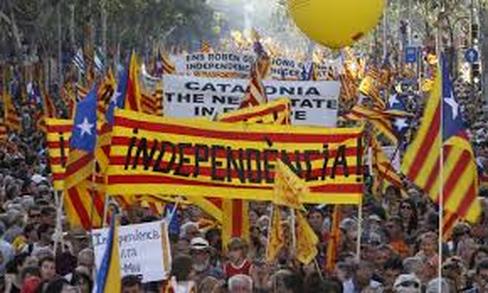|
Both the Catalan nationalists, and their Spanish nationalist opponents, lack a broad strategic vision
The campaign for Thursday’s elections in Catalonia has been depressingly symptomatic of two dangerous and interlinked contemporary tendencies in western democracies. One is the prevalence of tactics over strategy, and the other is the preference for slogans over substance. Twitter is the ideal, and toxic, medium for this debased political culture. Calling snap elections in the region was an uncharacteristically clever tactical move by the lugubrious Spanish prime minister, Mariano Rajoy. For years, his only response to the accelerating momentum of the Catalan independence movement had been obtuse immobility. He had hidden from the challenge of engaging with change behind the 1978 constitution, which had been forged under intense pressure from the heirs of the Franco dictatorship. This was a disastrous strategic failure, but it was tactically beneficial to his conservative Partido Popular (PP) in the rest of the country. It played on a barely dormant nostalgia for authoritarian Spanish nationalism, and diverted attention from the corruption scandals in which the ruling party is mired. This article appeared in The Irish Times on 21 December, 2017. Read the whole piece here
0 Comments
There are two particularly troubling aspects to the ongoing crisis in Spain over the status of Catalonia.
The first is the re-emergence of what the Spanish call pensamiento único, or monolithic thinking, throughout the Madrid media. You can hardly find a single voice, with the very honourable exception of Iñaki Gabilondo’s video commentaries in El Pais, that demurs from the sole acceptable political line: the only cause of the crisis is the refusal by ornery Catalans to accept the constitution and the rule of law. A similar media orthodoxy ruled for many years regarding the Basque conflict. The circumstances today in Catalonia are, mercifully, very different. But the effect is the same: a blocking of the kind of open discourse that might resolve the conflict. Instead, messy and plural complexities are repeatedly reduced in Madrid to a comforting binary simplicity that Orwell might have appreciated: “Constitution good, Catalan nationalism bad.” This article appeared in The Irish Times on 20 November, 2017. Read it here. The spectre of the Franco dictatorship has quietly haunted Spain since his death 42 years ago next month. His legacy loomed over the Spanish-Catalan crisis long before many claimed to see the old general’s ghost in Barcelona two weeks ago, inspiring the Spanish police to assault Catalan voters at polling booths.
Undoubtedly some recent accusations from Catalan nationalists (and the Spanish left) about the return of Francoism have been outrageously exaggerated. Franco’s police were, routinely, infinitely more savage than their counterparts in Catalonia on October 1st. But dog whistles from conservatives in Madrid, attuned to Francoist nostalgia among their voters, have also inflamed the Catalan bonfire. Last week, a government spokesman appeared to threaten the Catalan leader, Carles Puigdemont, with the same fate as Lluís Companys. The latter was a democratic leader, tortured and executed by the Francoists in 1940. And the roots of the current Catalan crisis can be traced back to flaws in the transition from the Franco dictatorship in the late 1970s. This article was published in The Irish Times on 14 October, 2017; for full text click link below. Analysis: The monarch offered no olive branches, only the threat of a bigger stick
This article was published in The Irish Times on 4 October 2017 The restored Spanish monarchy has been warmly supported in the past by many democrats, and even by some republicans, for one very simple reason. They have long believed it is the only glue capable of bonding the fractious national project called Spain after the long dictatorship of Gen Franco. According to this view, King Juan Carlos, although the dictator’s designated heir, skilfully steered the country towards democracy in the late 1970s. He presented himself as democracy’s front-line defender during the attempted military coup of 1981, when he talked his insurgent military commanders back to barracks. By the time of the king’s abdication, three years ago, his image had been tarnished by his extravagant private life, which contrasted sharply with the austerity suffered by so many citizens. But many Spaniards invested high hopes in his son, Felipe VI. Indeed, some polls showed a public willingness to entrust him with more powers, to forge consensus among Spain’s increasingly polarised and fragmented political parties. He now faces the severest test of the monarchy’s unifying role, as the rapidly escalating crisis in Catalonia threatens to break up the Spanish nation state. Perception of authoritarian government denying gallant small nation right to express itself is widespread
Whatever happens next in Catalonia, the Catalan nationalists’ independence referendum campaign had already proved a significant success, from their own point of view, by Sunday afternoon, regardless of the outcome. This campaign, and especially Spain’s potentially disastrous response to it, has created a widespread perception that neatly reflects the Catalan nationalists’ favoured narrative. This can be seen both in much international news coverage, and in the ever more defiant mood of many Catalan citizens on the streets. It is becoming common currency worldwide that an authoritarian, even brutal, central government has denied a gallant small nation the right to express itself democratically and peacefully. This article was published in The Irish Times on 2 October 2017 It’s a cliche, simply because it’s an important truth, that one’s first thoughts about a terrorist act should always be with the victims, to make some effort to imagine their plight.
For anyone even slightly familiar with Barcelona, the location of Thursday’s attack is terrifyingly easy to picture. A stroll from the Plaza de Catalunya down the broad expanse of the Ramblas, past the gastronomic cornucopia of Boquería market and the exquisite modernist frontage of the Palau de la Música Catalana is many people’s definitive experience of the city. And therefore, one supposes, a suitably iconic target for terrorists inspired by the so-called Islamic State. So this weekend, like so many familiar and unfamiliar places from Paris to Kabul, we have to imagine it stained with innocent blood. However, as we know all too well in Ireland, it does not take long for empathy with the victims of terrorism to morph into political blame games, perverting the essential task of understanding what exactly happened, why, and whether it could have been prevented. This article was published in The Irish Times on August 19, 2017 Read more here Barcelona Letter: Many Catalans are less than enthusiastic for a divorce from Madrid
Barcelona was the first city in Spain I ever visited, back in 1973. The great Catalan capital was then resisting the dying clutches of the Franco dictatorship. I remember the menace of soldiers in coal-scuttle helmets, goose-stepping at the bottom of the Ramblas, rain pelting down, the streets barely lit. But I also remember, much more vividly, the rich odour of history and culture that oozed from every worn stone of the adjacent medieval Gòtic Barri. I would, of course, have had to call it the Barrio Gótico in those days – had I been rash enough to ask a policeman for directions. The Catalan language was no longer illegal, but its public use, especially by a foreigner, was still regarded with intense hostility by the regime. Coming back four decades later, after a complete absence of nearly 20 years, it is good to find that the Gòtic Barri can still exercise its old magic. |
Articles & BlogArticles on the environment; Spanish, Catalan and Basque politics; travel; culture; and other subjects; interspersed with personal reflections and images Archives
October 2022
Categories
All
|



 RSS Feed
RSS Feed